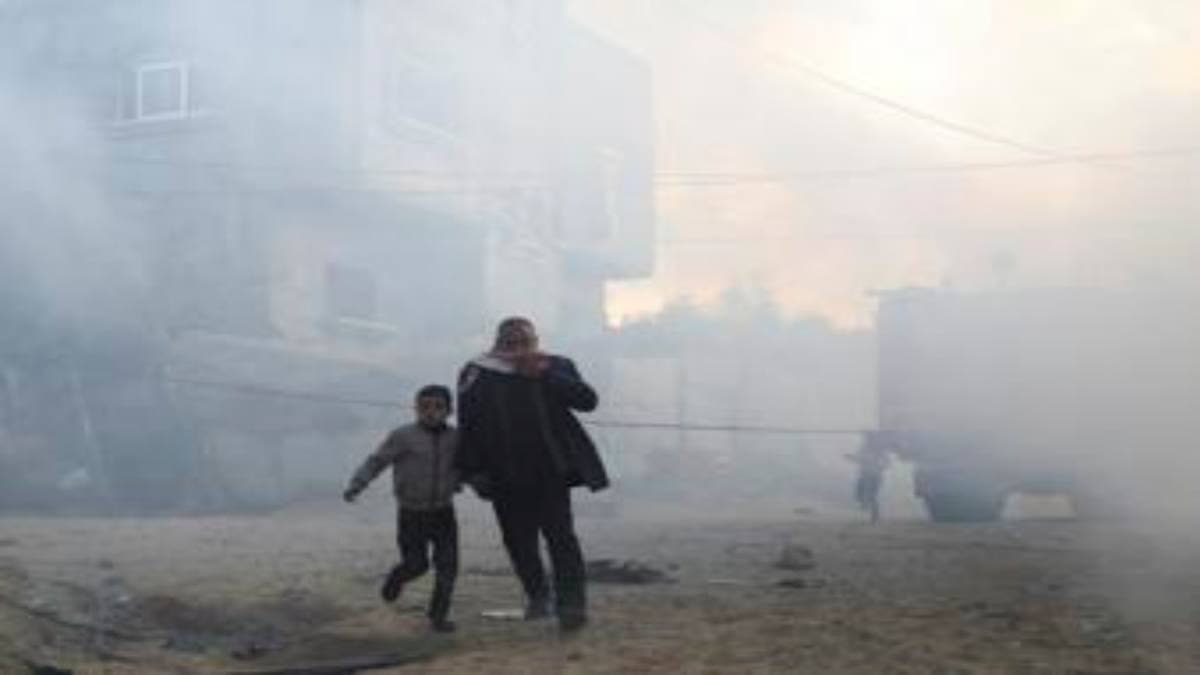Rafah (Gaza Strip):Israel ordered new evacuations from parts of Gaza City on Tuesday, as a study led by the U.N. children's agency found that one in six children are acutely malnourished in the isolated and largely devastated north of the territory, where the city is located.
The report finds deepening misery across the territory, where Israel's air and ground offensive, launched in response to Hamas' Oct. 7 attack, has killed over 29,000 Palestinians, obliterated entire neighborhoods and displaced more than 80% of the population.
Israel has vowed to expand the offensive to the Gaza Strip's southernmost city of Rafah, where more than half of the territory's population of 2.3 million has sought refuge from fighting elsewhere. Many have crowded into sprawling tent camps and overflowing U.N.-run shelters near the Egyptian border.
On Tuesday, the military ordered the evacuation of the Zaytoun and Turkoman neighborhoods on the southern edge of Gaza City, an indication that Palestinian militants are still putting up stiff resistance in areas of northern Gaza that the Israeli military said had been largely cleared weeks ago.
Residents said there have been airstrikes and heavy ground fighting in eastern parts of Gaza City over the past two days. "The situation is very difficult," said Ayman Abu Awad, who lives in Zaytoun. "We are trapped inside our homes."
A POTENTIAL 'EXPLOSION' OF PREVENTABLE CHILD DEATHS
The report by the Global Nutrition Cluster, an aid partnership led by the U.N. children's agency, UNICEF, says more than 90% of children under five in Gaza eat two or fewer food groups a day, known as severe food poverty. A similar percentage are affected by infectious diseases, with 70% experiencing diarrhea in the last two weeks.
More than 80% of homes lack clean and safe water, with the average household having one liter (quart) per person per day, according to the report released Monday.
In Gaza's southernmost city of Rafah, where most humanitarian aid enters, the acute malnutrition rate is 5%, compared to 15% in northern Gaza, which has been isolated by the Israeli military and largely cut off from aid for months. Before the war the rate across Gaza was less than 1%, the report said.
"The Gaza Strip is poised to witness an explosion in preventable child deaths, which would compound the already unbearable level of child deaths in Gaza," UNICEF official Ted Chaiban said in a statement.
A U.N. report in December found that Gaza's entire population of 2.3 million Palestinians is in a food crisis, with a quarter of the population facing starvation.
Israel says it does not restrict the import of humanitarian supplies, but aid groups say delivery within Gaza has been severely hampered by Israeli road closures, ongoing fighting and the breakdown of law and order as Israeli strikes have targeted the Hamas-run police force.
The U.N. agency for Palestinian refugees, the main provider of aid in Gaza, said earlier this month that Israel was holding up a food shipment that could feed over a million people. Israel accused 12 employees of the agency of taking part in the Oct. 7 attack, without providing evidence. That led several donors to freeze vital funding for the agency, even after it fired the workers and launched an independent investigation.
NO END IN SIGHT TO MONTHSLONG WAR
The war began when Hamas-led militants burst through Israel's formidable border defenses and rampaged across communities in southern Israel, killing some 1,200 people, mostly civilians, and taking around 250 hostage. The militants are still holding some 130 captives, around a fourth of whom are believed to be dead, after most of the rest were released in a prisoner-hostage exchange last year.
Israel responded to the attack with one of the deadliest and most destructive military campaigns in recent history in the tiny coastal enclave, which has been under an Israeli and Egyptian blockade since Hamas seized power from rival Palestinian forces in 2007.
The United States, Israel's top ally, says it is still working with mediators Egypt and Qatar to try to broker another cease-fire and hostage release agreement. But those efforts appear to have stalled.
Gaza's Health Ministry said on Monday that the Palestinian death toll had risen to 29,092 since the start of the war, with around two-thirds of the fatalities being women and children. More than 69,000 Palestinians have been wounded, overwhelming the territory's hospitals, less than half of which are even partially functioning. The ministry does not distinguish between civilian and combatant casualties in its count.
Israel says it has killed over 10,000 Palestinian militants but has provided no evidence for its count. The military says it tries to avoid harming civilians and blames the high civilian death toll on Hamas because the militant group fights in dense residential neighborhoods. The military says 237 of its soldiers have been killed since the start of the ground offensive in late October.
Read More
- Israel Strikes across Gaza as US Says It Will Block Another Cease-Fire Resolution at UN
- US Envoy Says Israel Has Not Presented Evidence That Hamas Diverted UN Aid Deliveries in Gaza
